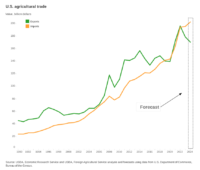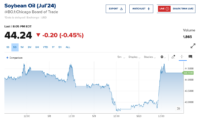Bloomberg's Clarice Couto reported this past Friday that "a surprising tax change in agriculture powerhouse Brazil has the potential to make soy grown in the world’s largest bean exporter less…
Large Chinese Imports of South American Soybeans Continues; Another “Humanitarian Corridor” Grain Ship Sails, While Temperature Lowered on Ukraine, Poland Rift
Bloomberg writers Hallie Gu and Tarso Veloso Ribeiro reported earlier this week that, “China’s voracious appetite for South American soybeans has continued into a period typically dominated by the US, an ominous sign for that nation’s growers as their harvest begins.
“Importers have booked at least 20 cargoes from Brazil and Argentina over the past two weeks for delivery to China during October, November and into December, according to people familiar with the matter. Chinese buyers were already snapping up Brazilian beans for delivery in the fourth quarter as far back as July.

“Brazil has benefited from a bumper harvest, allowing the country to offer soybeans at lower prices than rival producers. That’s left US suppliers with a smaller-than-usual window in which to tap Chinese buyers.”
🇨🇳#China's imports of #soybeans, #wheat, #barley and #pork were greater than last year through the first 8 months of 2023. #Corn is down 12%, though the volume is still significantly larger than pre-2020 levels. YTD soy imports are record high. pic.twitter.com/D6iFmaKvPN
— Karen Braun (@kannbwx) September 18, 2023
Gu and Ribeiro explained that, “In the first eight months of 2023, China imported about 48 million tons of Brazilian soybeans, up 17% from a year ago, according to customs data.
“An additional constraint for US producers will be domestic. Water levels on the Mississippi River, which carries almost half of the nation’s agricultural exports, have been dropping since June, restricting the volume of crops allowed on each barge.”
The Mississippi River remains near historic low levels with no significant rises forecast over the next 2 weeks. https://t.co/xl9kL7OyRk https://t.co/eOk4gNvLQe
— NWS Memphis (@NWSMemphis) September 20, 2023
Meanwhile, New York Times writer Matthew Mpoke Bigg reported today that, “A second cargo ship loaded with wheat departed from a Ukrainian port on Friday, another test of the country’s determination to set up a corridor for its exports across the Black Sea even as the Russian Navy poses a potential threat to shipping in the region.”
The vessel AROYAT (flag 🇵🇼 Palau) left the port Chornomorsk after loading 17,6K Ukrainian wheat for Egypt.
— Oleksandr Kubrakov (@OlKubrakov) September 22, 2023
This is the second bulker entered the port of Chornomorsk using temporary corridor for civil shipping. The first was RESILIENT AFRICA with 3K wheat for Asia.
The crew of… pic.twitter.com/JX1n7JPHnS
The Times article pointed out that, “Whether Ukraine can fully establish its new grain route depends on several factors, including the willingness of private shipping companies to accept an elevated risk, particularly while the vessels are in port or in Ukrainian waters, shipping experts say.
⛴️3 new cargo vessels are on the way to enter Chornomorsk and Pivdenij ports for loading export products.
— Oleksandr Kubrakov (@OlKubrakov) September 22, 2023
Bulk carriers AZARA, YING HAO 01, ENEIDA is using temporary corridor established by the Ukrainian Navy in order to export 127K tones of agroproducts and iron ore for China… pic.twitter.com/vTpDo6R1pC
“The greatest risk is a further escalation of conflict in the Black Sea, which in recent months has become an increasingly central theater of the wider war between Moscow and Kyiv.”
Very good meeting with @ZelenskyyUa, @KlausIohannis and @GabrielMariya.
— Ursula von der Leyen (@vonderleyen) September 20, 2023
We are expanding our Solidarity Lanes to bring Ukraine’s grain out to the world, despite Russia’s blockade of the Black Sea.
We appreciate Ukraine’s effective measures to prevent any market distortions in… pic.twitter.com/VZA6MmLBFR
Bloomberg writer Ben Sharples reported today that, “Russia has previously said it would treat any vessels headed to Ukraine’s ports as potential carriers of weapons, and last month opened fire on a ship to force it to stop for checks.”
Elsewhere, Loveday Morris and Emily Rauhala reported in today’s Washington Post that, “Poland, one of Ukraine’s staunchest backers in the fight against Russia’s invasion, said it was halting new weapons shipments to Kyiv, as tensions over grain exports continued to escalate between Ukraine and its Central European neighbors.”

However, the Post article indicated that, “But Poland appeared to attempt to ease tensions later Thursday, as President Andrzej Duda called for calm and warned against an ‘over-interpretation‘ of the prime minister’s comments. He said [Polish Prime Minister Mateusz Morawiecki] meant that Poland wouldn’t transfer new weapons from the stocks it had purchased from countries such as the United States and South Korea. Speaking to Polish reporters at the U.N. General Assembly in New York, he said it was still possible that weapons from old army stocks could be transferred to Kyiv ‘just as we have done before.'”
Morris and Rauhala explained that, “Poland, Hungary and Slovakia said last week they would keep in place a ban on the import of Ukrainian grain products as an agreement with the European Union expired.”
“Ukrainian officials pledged this week to take legal action against Poland, Hungary and Slovakia to overturn the ban, though Kyiv’s chances of achieving a quick remedy seemed virtually nonexistent,” the Post article said.
Ukraine initiates WTO dispute complaints against Hungary, Poland and Slovak Republic #TradeDisputes https://t.co/MzELBhlfqG pic.twitter.com/StcGbs2cvz
— WTO (@wto) September 21, 2023
Today’s article added that, “Slovakia and Ukraine reached agreement on a new licensing system for trading in grain during an online meeting between the two countries’ agricultural ministers Wednesday, the Slovak government confirmed Thursday. The country’s ban on Ukrainian grain will continue ‘until this system is launched and its full operation is tested,’ the agricultural ministry said, without giving a timeline.
“Ukraine also agreed to halt its legal action against Slovakia within the World Trade Organization and drop threats for reciprocal bans on Slovak products.”
Yesterday, Financial Times writer Roman Olearchyk reported that, “Ukraine’s agriculture minister Mykola Solskyi said he and his Polish counterpart Robert Telus had ‘agreed to find a solution‘ over a stand-off that saw Poland, Hungary and Slovakia this week prolong bans on Ukrainian grain imports.
“Solskyi’s statement came as Slovakia’s agriculture ministry announced it had agreed to set up a licensing system for Ukrainian grain imports, allowing its ban to be lifted.”
And Bloomberg writers Piotr Skolimowski and Natalia Ojewska reported yesterday that, “The Polish government sought to walk back remarks by its premier that the country had stopped weapons shipments to Ukraine, tapping the brakes on an escalating dispute that’s shaken a key wartime alliance.
“After Prime Minister Mateusz Morawiecki said Poland is no longer transferring weapons to Ukraine, his office aimed to lower the temperature following a heated exchange of barbs this week that’s dismayed allies and undermined a relationship that’s been crucial to aid to Kyiv.”
COLUMN: Poland and Ukraine are falling for Putin's grain ploy.
— Javier Blas (@JavierBlas) September 22, 2023
Kyiv can't afford to antagonize Warsaw, and vice versa #OATT #Ukraine #wheat | @Opinion with @MarcChampion1 https://t.co/Z9RhjBwGIR
Also yesterday, Reuters writer Anna Pruchnicka reported that, “Ukraine agreed to license its grain exports to Slovakia on Thursday and pushed for a deal with Poland to end restrictions by its neighbours on grain that it has been forced to send overland since Russia’s invasion last year.”
“Ukraine said its farm minister, in a phone call with his Polish counterpart, agreed to work out a solution to the grain dispute in the interests of both countries,” the Reuters article said.







